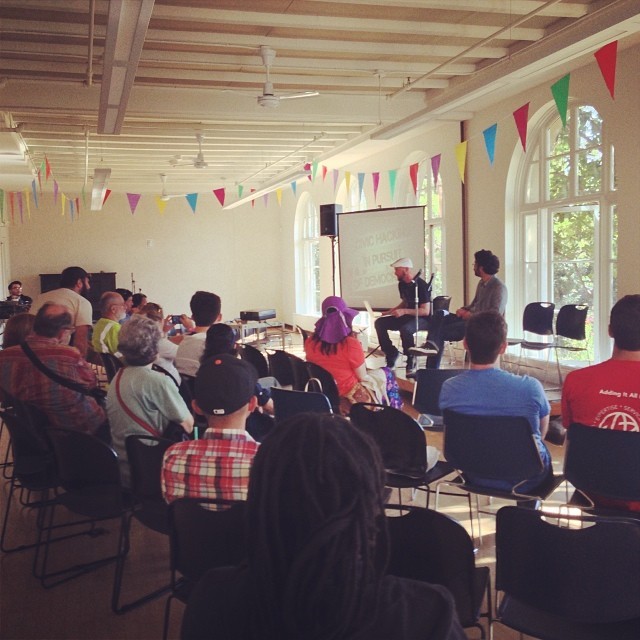Many local government officials have to disclose information about potential conflicts of interest, but this information is difficult to find released as open data.
Continue readingMontgomery County’s Open Data Town Hall, the Town Hall of the Future
On Thursday November 21st, Montgomery County, Maryland hosted an Open Data Town Hall to solicit feedback from citizens about what data they would like to see prioritized for release online under Montgomery County’s open data law.
Continue readingDC Approves Campaign Finance Reforms
In a legislative meeting today, DC council members unanimously approved a bill that moves campaign finance in the District toward greater transparency. The legislation requires electronic filing of campaign finance information and the publication of that information online within 24 hours -- language that Sunlight's local team recommended in the bill's drafting process.
Councilmember Kenyan McDuffie, who moved the bill through Council, thanked Sunlight for our role in this win for transparency:
Thanks also to the @SunFoundation for their input on transparency reforms that are cornerstone of this DC campaign finance reform
— Kenyan R. McDuffie (@CM_McDuffie) December 3, 2013Evaluating Municipal Campaign Finance Data: Oakland
How do municipalities measure up to standards for releasing campaign finance data? Today, we look at Oakland.
Continue readingEvaluating Municipal Campaign Finance Data: Alexandria
How do municipalities measure up to standards for releasing campaign finance data? Today, we look at Alexandria.
Continue readingEvaluating Municipal Campaign Finance Data: Albuquerque
How do municipalities measure up to standards for releasing campaign finance data? Today, we look at Albuquerque.
Continue readingOpen Data Policies to Promote Transparency and Engagement
In an upcoming session at the National League of Cities Congress of Cities and Exposition in Seattle, we'll take part in exploring how open data, and open data policies, can help increase and improve civic engagement.
Continue readingWhich of Your Local Candidates Support Transparency?
In anticipation of this year’s local elections, many open government advocacy groups have surveyed local candidates on open data issues and shared the results in hopes of informing and mobilizing citizens to vote for candidates that are committed to transparency. We’ve seen open data questionnaires conducted around North America this fall for a variety of motivating factors, including: To Fight Past Corruption, To Foster New Open Data Initiatives—or simply—To Maintain Current Open Data Momentum. This trend of open data surveys is indicative of a widespread interest in transparency issues this election season, and with a growing number local governments adopting administratively-sensitive open data laws, a trend we likely see more of in the future.
Below we have rounded up a mini-landscape of open data candidate questionnaires distributed this election season.
Continue readingOakland’s Public Participation Route to Open Data Legislation
 Steve Spiker and Eddie Tejeda (open data policy organizers) sharing OpenOakland’s work at East Bay Mini Maker Faire.
Oakland passed an open data law earlier this month (October 15, 2013) that was generated by the people and for the people. Open Oakland captain Steve Spiker (Spike) gathered the Open Oakland and broader open government community to draft and chat the best open data policy for Oakland. Spike and Open Oakland, in addition to garnering support for the open data policy, cultivated the policy from start to finish through drafting, public comments, a call to experts, and [teleconferenced] public meetings. Open Oakland serves as an excellent example of the community's role in generating open data policy, and their public input process is an exemplar route to incorporating public perspectives into policy. The Sunlight Foundation's Guideline to incorporating public perspective into policy implementation reads as follows:
Steve Spiker and Eddie Tejeda (open data policy organizers) sharing OpenOakland’s work at East Bay Mini Maker Faire.
Oakland passed an open data law earlier this month (October 15, 2013) that was generated by the people and for the people. Open Oakland captain Steve Spiker (Spike) gathered the Open Oakland and broader open government community to draft and chat the best open data policy for Oakland. Spike and Open Oakland, in addition to garnering support for the open data policy, cultivated the policy from start to finish through drafting, public comments, a call to experts, and [teleconferenced] public meetings. Open Oakland serves as an excellent example of the community's role in generating open data policy, and their public input process is an exemplar route to incorporating public perspectives into policy. The Sunlight Foundation's Guideline to incorporating public perspective into policy implementation reads as follows:
Implementing the details of an open data policy will benefit from public participation. Open data policies not only have effects government-wide, which will require consideration, but also have consequences for a variety of stakeholder groups outside of the government. Allowing these groups to participate in the decision-making process (and make real contributions) can have great benefits for policy creation and execution. Stakeholders and experts can bring to the table valuable new perspectives that highlight challenges or opportunities that might not otherwise be obvious. Formal mechanisms for collaboration can include hearings, draft proposals open for public comment and contribution, and online resources like wikis and email lists.Below we have outlined Oakland's public input process and how it is part of a growing trend to openly include community perspective, desires, and concerns into open data policy. Continue reading
A Roadmap for Releasing Municipal Campaign Finance Data
We've created a Municipal Campaign Finance Data Guidebook to help local policymakers and advocates create stronger disclosure around this crucial information.
Continue reading
